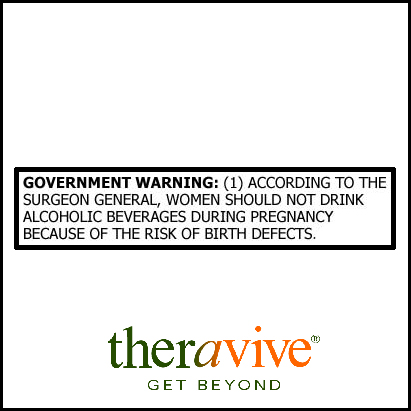 Fetal Alcohol Spectrum Disorders (FASD) are a range of conditions that can affect a baby exposed to alcohol prenatally. The term is not a clinical diagnosis, but includes a range of diagnoses that are related to alcohol exposure in utero. The problems children experience as a result of fetal alcohol exposure are physical, intellectual/learning and psychological impairment. Often children will experience all of these problems.
Fetal Alcohol Spectrum Disorders (FASD) are a range of conditions that can affect a baby exposed to alcohol prenatally. The term is not a clinical diagnosis, but includes a range of diagnoses that are related to alcohol exposure in utero. The problems children experience as a result of fetal alcohol exposure are physical, intellectual/learning and psychological impairment. Often children will experience all of these problems.
How Do FASD Happen?
About 40,000 babies are born with FASD annually. At this time, it is believed that no amount of alcohol is safe for a woman to drink while pregnant. Any alcohol consumed by a pregnant woman is also consumed by the baby. As the mother’s blood alcohol content rises, so does that of the fetus. Due to its size and underdevelopment of the organs, the tiny brain of the fetus is quickly saturated with alcohol, effecting the Central Nervous System (CNS) and all aspects of bodily functioning. The damage to the brain, CNS and other parts of the body can be permanent, resulting in FASD. FASD is one of the leading preventable causes of intellectual disabilities (previously known as mental retardation).
Types of FASD
Different conditions fall within the range of fetal alcohol spectrum disorders. These include:
· Fetal Alcohol Syndrome (FAS) – FAS is on the most severe of the conditions on the continuum of FASD. Those who have FAS often have unusual facial features, neurological problems and delayed and/or below average growth and development. Among thees problems are learning, memory, attention and concentration, communication, vision and/or hearing difficulties. School and social situations are frequently very difficult for these children and adults. Fetal death is the most extreme result of alcohol exposure.
· Alcohol-Related Neurodevelopmental Disorder (ARND) – Those with ARND often have intellectual disabilities, behavioral problems and difficulty learning. Among their problems in school, attention and concentration, math, memory, impulse control and judgment are most often impaired. These problems were previously referred to as Fetal Alcohol Effects (FAE).
· Alcohol-Related Birth Defects (ARBD) – People with ARBD often experience kidney, heart, bone and/or hearing impairment.
 FASD Across the Lifecycle
FASD Across the Lifecycle
Infancy – low birth weight; over-stimulated by sensory input (noise, light, touch); slow or delayed growth and development (not reaching developmental milestones within normal limits); irritable; difficulty sleeping; increased number of ear infections.
Toddlers – poor memory recall; hyperactivity; fearlessness; requires a lot of physical contact; invasive with poor boundaries.
School-age – problems with attention and concentration; poor fine and gross motor skills; lack of coordination.
Older Children – problems keeping up in school; low self esteem and awareness that they are not like other children.
Teenagers – lack of impulse control; need to be reminded of basic concepts everyday; lack of discretion in public and private behavior.
Adults – often have difficulty with activities of daily living, ie, managing finances, maintaining employment, managing a household.
Living with FASD
Many with FASD fall into the mild or moderate range, exhibiting primarily learning, emotional and/or behavioral problems. They are often not recognized as FASD in early childhood, but exhibit problems within the first year of entering school that continue throughout their lives. These problems may take the form of specific learning disabilities in one or more subjects, attention and concentration problems, such as ADHD, and/or difficulty getting along with peers and teachers.
Some with moderate to severe FASD have trouble managing their emotions, often getting into fights or behaving aggressively. They may destroy property, bully other kids or have difficulty in social settings due to poor impulse control and problems recognizing social cues. These children are often identified by teachers and referred for testing by the school psychologist. They may come to the attention of the school counselor or guidance counselor early in their school years. Some will be placed in special education classes for extra support and/or smaller class sizes.
Many with attention and concentration problems and strained peer relations will be referred for a psychiatric evaluation to determine if medication would be helpful. There are medications that help with attention and concentration, but counseling, parenting classes and classroom behavior-modification programs may be required for those who are aggressive and/or have difficulty with peers and authority.
As these kids get older, they are at risk for a host of problems if not treated. Early intervention is the best way to avoid more serious problems later. Those who do not get help as children, and some who do, may get involved with the juvenile justice system as teens. Parents often find they have serious behavioral problems to address at home, some that are very disruptive to family life. Family and individual counseling and/or medication may help; parenting support is usually required.
As adults, people with moderate to severe FASD may have problems getting and keeping a job due to their learning disabilities and/or poor social skills. This can result in problems with money and housing, relationships and other issues. Some with more severe problems related to FASD may be institutionalized or require adult supervision most of their lives.
Prevention and Treatment
There is no cure for FASD, as these disorders result from brain damage to the fetus in utero. Prevention is the only way to avoid these problems, which requires pregnant women to abstain from alcohol, drugs (and cigarettes) while pregnant or when they may become pregnant. Many times the damage to the fetus happens in the early weeks of pregnancy when the mother is unaware that she is pregnant. If there is any possibility that your baby may have been exposed to alcohol, drugs or cigarettes prenatally, be honest with your doctor and have regular examinations to look for possible fetal alcohol effects. Early intervention is the best hope of avoiding more serious problems later. Seek counseling if you are having problems managing your child’s behavior, and partner with teachers and school staff for the best outcome.
_________________________________________________________________________________________________________________________________
"About FASD." FASD Center for Excellence. Web. 18 Mar. 2014.
"Living with FASD." NOFAS National Organization on Fetal Alcohol Syndrome. Web. 18 Mar. 2014.
About the Author
 LuAnn Pierce, LCSW
LuAnn Pierce, LCSWI am a clinical social worker, therapist and writer. Currently, I offer online therapy and coaching services to people in Colorado and Wyoming. As a provider for the CO Department of Vocational Rehabilitation and the National MS Society, my expertise in counseling people who have disabilities and chronic illness is considerable. I have written for About.com, DailyRx.com, Theravive.com, GoodTherapy.org, SelfHelpMagazine.com and contribute to several other online health and mental health sites.
Office Location:
19th & Dahlia
Denver, Colorado
80220
United States
Phone: 303-910-2425
Contact LuAnn Pierce, LCSW
Professional Website:
http://HireASocialWorker.com